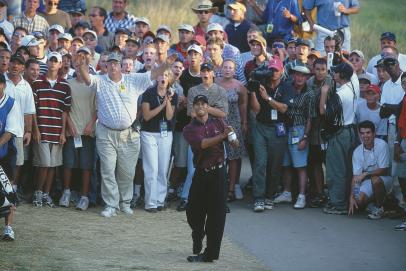“Out here in the heat and humidity, Valhalla is gangly, hard to love and still trying to grow up and find personal acceptance. Could that happen this week? Well, it’s going to be a struggle. Let’s just say that the chances of Valhalla earning respect this week are about as good as the Kentucky Derby switching from horses to lawn mowers.” —Thomas Bonk, Los Angeles Times, prior to the 2000 PGA Championship
I fell in love with Valhalla in 2014, which is a little too typical of me—this kind of embarrassing affinity for courses that smarter architectural minds tell me are gimmicky and poor. The land itself worked its magic, and part of that was the Civil War buff in me that let history infuse my surroundings with meaning; this was where the Confederates nearly captured Louisville and the entire state of Kentucky in 1862. Here’s what I wrote at the time about what I saw in the Ohio Valley:
“The slow, brown waters of Floyds Fork, a tributary of the Salt River, carve a sinuous path through the course. With the sycamores and birches growing out from the shore, the whole scene gives off a primordial vibe. The front nine is mostly low river plains, with the back nine rising to higher ground, lined with silver maples and oaks and hickories … the bluegrass roughs, the dense vegetation, and the deep umber of the river waters made it look totally unique.”
It was also unbearably humid, especially that Sunday as the sun burned off the remnants of an early afternoon shower and the steamy air had nowhere to go in the valley, just festering as temperatures climbed close to triple digits. I’ll never forget the words of my friend Igor, walking with me, who called the scene “an upper middle-class Vietnam.”
Despite my inclination to view Valhalla through a historical lens, it is not old. The Jack Nicklaus design opened in 1986, the PGA of America bought it in 2000, and in 2022 it was sold it to a group of local businessmen. That group is hoping the course will attract more majors down the road, but this week’s PGA Championship essentially marks a kind of last hurrah—at least for the foreseeable future.
From the very start, Valhalla has been the recipient of a fair amount of flack. In Thomas Bonk’s L.A. Times piece quoted above, Hal Sutton went on record objecting to the course being mentioned in the same breath as Pebble Beach or Augusta or St. Andrews—the other three major championship venues on the 2000 calendar.
“It doesn’t measure up,” he said.
As for specifics, the island green on the 13th hole is often cited as a cheap gimmick, and there’s a general thought that the course plays too easy especially on the par 5s (scores have been low, but not shockingly low). After the 2000 event, Gary Van Sickle in Sports Illustrated poked fun at the “toilet seat” green on 18, power lines on part of the front nine and a tendency for slow play due to the bunched-up design, long walks to tees and small greens. David Duval said it was better suited for the Nike Tour, Steve Pate said it was great until you got within 10 yards of the greens, and Tom Kite afforded less-than-stellar review when he said it was “not one of Nicklaus’ better works.”
More PGA Championship Preview Coverage PGA Championship Was Tiger Woods’ mysterious bounce at the 2000 PGA caused by fan interference? Investigating one of golf’s greatest conspiracy theories  Majors PGA Championship 2024: Here’s the full field competing at Valhalla
Majors PGA Championship 2024: Here’s the full field competing at Valhalla  PGA Championship Michael Block on his ‘Year of Blockie’ and what happens when your 15 minutes of fame are up
PGA Championship Michael Block on his ‘Year of Blockie’ and what happens when your 15 minutes of fame are up
“I don’t think you want to hold a PGA at the Phoenix Open,” Kevin Sutherland opined, while the nicest quote Van Sickle could unearth came from Paul Stankowski. “I don’t completely hate some of the holes on the back nine,” he said.
But Van Sickle reserved his greatest vitriol for the greens.
“An exercise in bad excess,” he called them, “a leftover from ’80s architecture that, unlike bad ’80s music, didn’t go away.”
Nicklaus himself acknowledged he “got carried away” with the greens, seeing as this was in the midst of his “Humpty-Dumpty period.”
The greens have since been rebuilt, but in an otherwise positive review here at Golf Digest, Ron Whitten still took issue with the opening half of the course.
“The front is unattractive, sitting in the floodplain armpit of a muddy, eroded river called Floyds Fork,” he wrote, “with ill-disguised high-tension electrical towers parallel to the par-5 seventh.”
Word on the street is that improvements continue up to the present in what can seem like a never-ending process at Valhalla.
And yet!
And yet … for all the hatred and animus, every review you read online from a rank-and-file player is glowingly positive, and the course continues to find its spot on top 100 lists, including at our own website. More importantly, at least for me, is that it has an almost surreal tendency to produce incredible events. A year ago, we created a “prestige vs. results” matrix that sought to measure which venues that have hosted multiple majors delivered great results, which had historical or design prestige, and which brought both or neither to the table. Valhalla stood out as a course with almost no prestige (third-to-last on our list of 40 courses), but first in terms of sheer results.
The 1996 PGA Championship is the outlier among the bunch, but it featured a playoff between Mark Brooks, looking for his only major, and Kentucky native Kenny Perry, the hometown hero. Perry had a great chance to secure the win, but a bogey on 18 brought him to 11 under, and Brooks made birdie to force sudden death. On the firwst extra hole, Perry again made a mess of 18 while Brooks birdied again to win his only major (and his last PGA Tour event ever).
Valhalla’s High Drama in Pictures 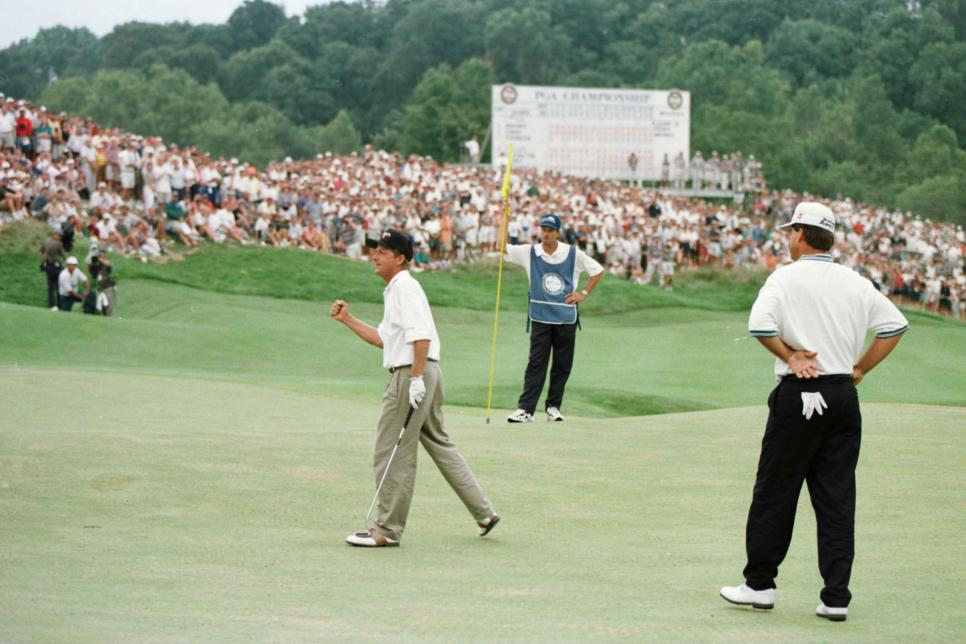
When Valhalla first held the PGA Championship in 1996, Mark Brooks outlasted Kentucky native Kenny Perry in a playoff.
David Cannon
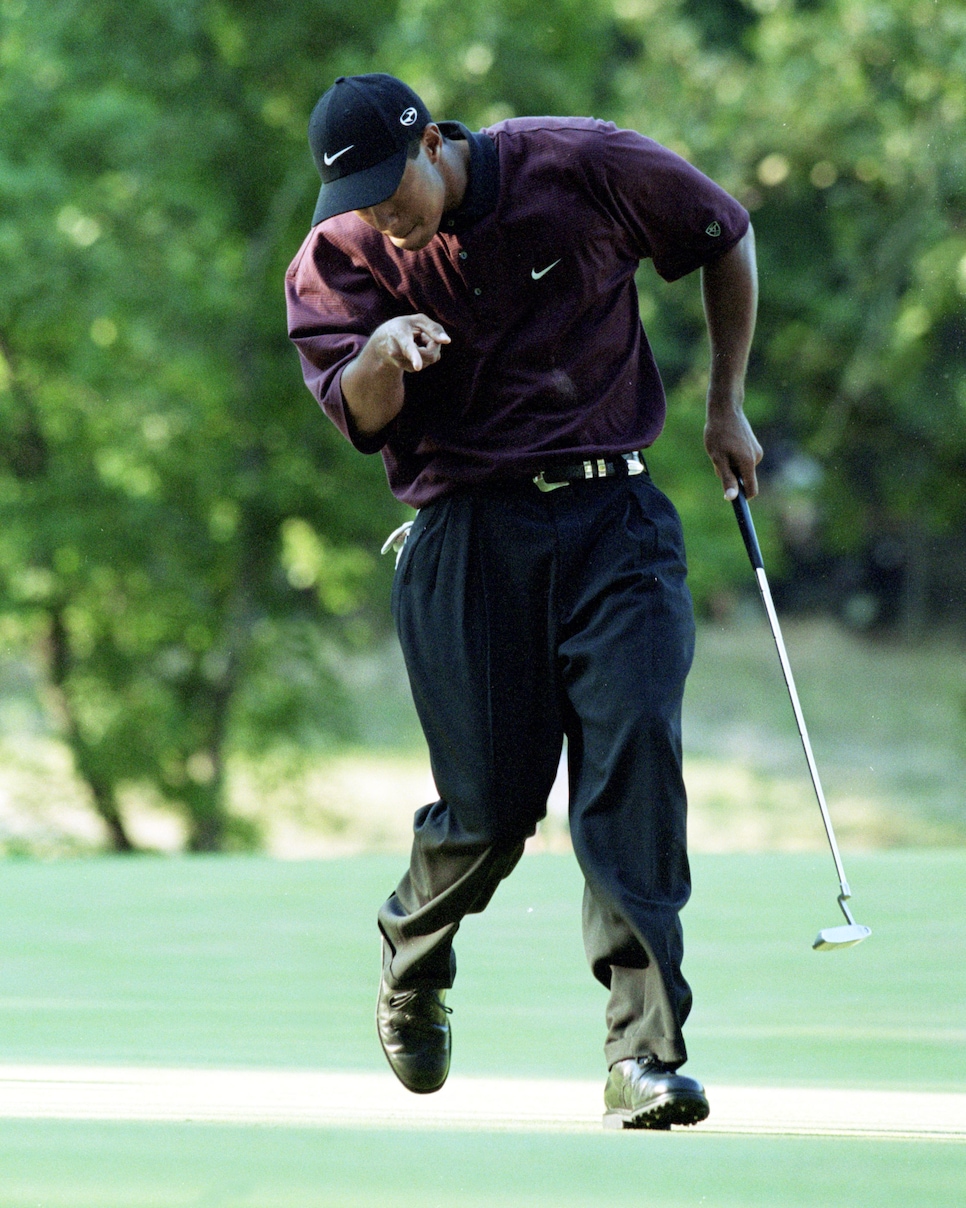
Four years later, at the 2000 PGA, Tiger Woods beat Bob May in a thrilling playoff.
David Cannon

In desperate need of a win at home, captain Paul Azinger’s U.S. team came through at the 2008 Ryder Cup.
Sam Greenwood
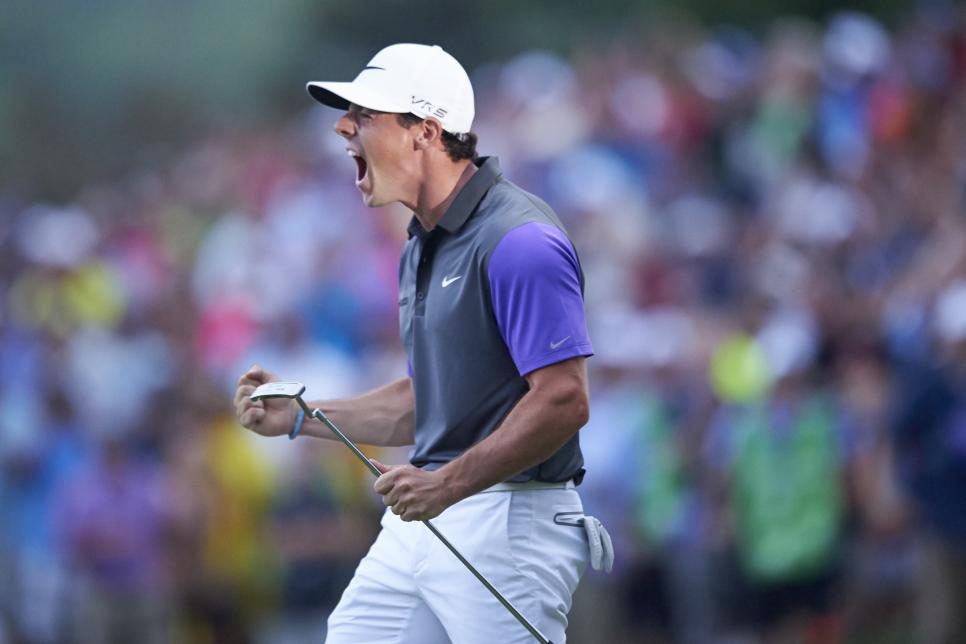
Rory McIlroy pulled out a fourth major title in the gloaming at the 2014 PGA.
Fred Vuich
Next came 2000, and one of the most dramatic major wins of Tiger Woods’ career, when he was dueled to the very brink by the unlikely Bob May. May matched Tiger’s 31 on the back nine in the final round and hit an iconic double-breaking birdie putt on 18 to force Tiger to convert a five-footer for a spot in a playoff. This particular playoff was a three-hole aggregate affair, and a birdie by Woods on the first was the only daylight between the two.
In 2008, Valhalla hosted the Ryder Cup, and while it wasn’t as close as the two PGA Championships preceding it, it was an exciting and vital match for the United States team, which was coming off its lowest stretch in the history of the event after two straight embarrassing blowout losses. Led by captain Paul Azinger, without Tiger Woods (who won the U.S. Open at Torrey Pines earlier that year on a broken leg but was forced to shut the season down afterward), surprising stars like Perry, Boo Weekley and Anthony Kim led the Americans to a shocking win. Azinger’s work as captain would eventually provide the blueprint for the American resurgence in home Ryder Cups.
More PGA Championship Preview Coverage  Until Valahalla Golf Digest Logo The five holes that will decide who wins the 2024 PGA Championship
Until Valahalla Golf Digest Logo The five holes that will decide who wins the 2024 PGA Championship  The More You Know For the last time, the PGA is NOT run by the PGA Tour: An idiot’s guide to who runs what in golf
The More You Know For the last time, the PGA is NOT run by the PGA Tour: An idiot’s guide to who runs what in golf 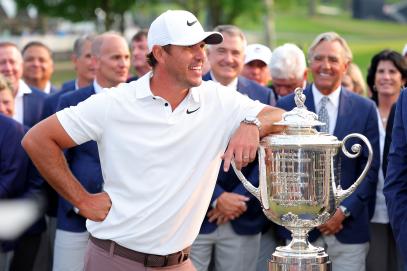 PGA Ranking PGA Championship picks: The 13 best bets to win at Valhalla
PGA Ranking PGA Championship picks: The 13 best bets to win at Valhalla
And finally, there’s the 2014 PGA, the last major won to date by Rory McIlroy. I followed the action in person on that miserably muggy weather, and despite the oppressive conditions, it remains the most exciting final round I’ve ever seen in person. From McIlroy’s immaculate (and accidental) approach on 10 to set up eagle, to his glaring silence stacked up with Mickelson and Fowler on the sixth tee, to his birdie on 17 and the unbelievable controversy in the darkness on 18, it delivered the goods in every possible way.
That’s the rub with Valhalla—respect it or not, it delivers reliably great stories. Even its two Senior PGA Championships produced great champions (Hale Irwin, Tom Watson) and great finishes (a one-stroke win and a playoff, respectively).
Sure, this could be a matter of luck and circumstance, but I don’t buy it. There’s magic in the air in Kentucky, a strange kind of gothic voodoo, and it settles like the hot air in this specific patch of the Ohio River Valley. Fortune may deprive Valhalla of future majors, but it can’t strip away the past, and it can’t deny the present. Bet your life savings: We may not see the course again for a while when this week is over, but it will produce something monumental. It always does.
This article was originally published on golfdigest.com
